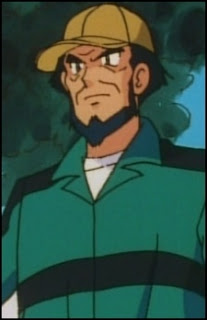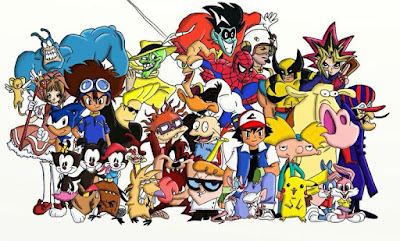One of the many quiet joys of being a twenty-something is witnessing a firsthand demonstration of the maxim “Everything old is new again.” Adolescents of today can look forward to someday seeing their favorite childhood toys and games suddenly return to relevance and enjoy fifteen more minutes of fame. Characters whose stories and theme songs fueled the minds and hearts of so many little lives not so long ago are almost destined for an eventual comeback, at the very least, on the t-shirt rack at Kohl’s—if not in full reboots of TV shows and movies. Ninja Turtles, X-Men, Pokemon…it only takes about 15 years for something popular to become venerable.
 |
| Do you recognize this man? |
This is a great thing. Nostalgia brings out the innocence that is often lost on the road to adulthood. While reminiscence about an old cartoon or movie sometimes leads to smug smiles at the simplicity or absurdity of our quondam entertainment, it also reinvigorates a flame of reverent childhood loyalty that cannot be totally smothered, even after many years. 15+ years after I first watched it,
Pokemon is a recognizably absurd series. Yet some of its story arcs—the Psychic Sabrina episodes, for instance—were so exciting to my 4th-grade self that I cannot but look upon the show with undying approval.
 |
| I hope you are old enough to remember this. It was grand. |
A consequence of this phenomenon is the sudden value that certain items gain after a given interval. Video games in particular have an odd lifecycle that follows the pattern: a new game, fresh from the factory, commands the heftiest price; as years go by, it descends into the related realms of sale and clearance items, and after 5 to 6 years all but the most wildly popular of games are, it would seem, lost to history. But most games are destined for a resurrection. Given about 20 years, many regain their majesty on the market. For proof, simply search eBay for any 8 or 16-bit game you played in childhood. Hundreds of such games are now hot commodities, sometimes commanding their original prices once again.
 |
| We've come a long way, baby! |
This should come as a surprise to us, because video games do not age well. Each successive generation of video game technology vastly outstrips its predecessors in ways that emphasize their weaknesses and highlight their seams. The first 16-bit games on SNES and Sega Genesis drew attention to the pixelated figures and simple color palettes of the 8-bit pioneers on NES. The first great 3D game, Super Mario 64, literally brought video games into a new dimension—and showed gamers how trapped they’d always been in side-scrolling 2D worlds. The best moments of turn-of-this-century gaming brought us close to photorealism in games like
Gran Turismo 3: A-Spec, and made previous games look like Tron with their embarrassingly obvious polygons. Years later, graphics continue to make flabbergasting strides and games become deeper and more immersive, all leading us to a rather sobering conclusion: the games that used to drive us up the wall with excitement simply aren’t that fun anymore.
 |
| Fire Mountain, Diddy Kong Racing: one of the few, the proud. |
OK, stop. If you’re a longtime gamer, you are currently drawing up a list of games that prove me wrong. Fine. Draw up the list. You’ll find that it contains about 10 titles that are so incredibly awesome that time barely dims their light. These are the exceptions that prove my rule. If you go back and try the other games, the ones that you haven’t played in over a decade, you’ll find that most of them leave you feeling hollow. They just aren’t that deep. They don’t look so amazing now. And if you go back far enough, the music is absolutely horrendous. And why, you’ll find yourself asking, did we tolerate a world where games were so insanely difficult? How did I ever get past Level 1? And why did I even want to?
The reason is simple. But first, we have to talk about Star Wars.
 |
| The Falcon is flying again, but to unexpected destinations. |
Many viewers of
Star Wars: The Force Awakens left the theater disappointed in how things have turned out for the heroes of the original films. I found myself wondering why the writers chose to take these great characters through such trying experiences and lead them to such grave outcomes in what was supposed to be their triumphant return to the screen. The world has had over 30 years to write the rest of the Star Wars story, and even those who gave it a modicum of thought would conclude that Han and Leia married, had kids, and joined Luke (and why not Lando, too?) on dozens of whirlwind adventures around the galaxy. Pretty much every one of these escapades ended with Han whooping in victory over the comlink of the Falcon, Leia gazing at him with the perfect balance of annoyance and adulation, and Luke grinning in quiet satisfaction as the day was saved and the heroes returned to safety.
That is not what happens in the new Star Wars. Far from it. Far, far away from it.
And here’s the point: while it might have been fun to bring out the old horses for one more lap around the barn, just like old times, I think it would have left us feeling hollow, like playing those old Sega Genesis games. The past worked well, but it is now the past. We have to let it be.
 |
| What will Luke's story teach us in future Star Wars movies? |
The new Star Wars movie may not give us the brand of romantic fun we were expecting, but it tells a story—and to do that well, it needs to twist and turn, to surprise us. A new crisis can compel us in ways that an old cliché cannot. Seeing our favorite characters face serious crises forces us to identify with them in different ways. Perhaps Han represented redemption to many viewers in the original films; now his character demonstrates that redemption is not a one-time deal, but must be renewed and carefully developed in order to retain its initial power. Luke’s storyline already showed us the rewards of patience, discipline, and indomitable hope—and now, perhaps, we see that even the greatest hero can fail, lose his vision, and need help in regaining awareness of his importance, his power, his indispensable role in the fight against evil.
I contend that we will be more satisfied seeing new crises in the Star Wars universe than recreating the dynamics of the past, for the same reason that our old video games often can’t seem to fulfill us in the way that they used to. Time brings change, and change means new circumstances which require creative thinking and different solutions. As Jesus said, “No one puts new wine in old wineskins.”
 |
| This was highly re-playable in 1995. Now, not so much. |
The old mindsets, the old solutions, were great for their time. They worked…or they didn’t work, and we learned from that. Either way, the past is what it is, and we can take from it however much or little we like. But to try to live in the past, or read your present experiences solely through your past ones, is a dangerous recipe for backward living. We need to take on the challenges of our day with hope and openness, and accept that they may require us to change in some positive way. We need to let crisis bring out the best in us. In the same way, we can revisit the games, shows, and movies of our past and value the entertainment they gave us. But we live in those past worlds at the expense of the present one. It is fine to escape now and then, but we must not get lost in our escapism. As fun as it is, you can only replay the “Sergeant Snot” level in
Earthworm Jim so many times before it becomes boring.
Our worlds change subtly every day, every year. It takes a while for us to discover the changes, but every now and then they hit us as we remember old friendships or see a picture from a previous era of our life. How will we respond to those changes that are still ahead? Will we allow our future self to take the best of what we’ve learned and apply it to the new crises that await us? Or will we simply dig into the past and find ourselves unfit to face the future? That is the constant question, and each of us has the power to answer it as we wish. May the Force be with you, always!
“In a higher world it is otherwise, but here below to live is to change, and to be perfect is to have changed often.”
—Blessed John Henry Newman








